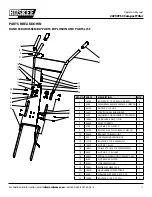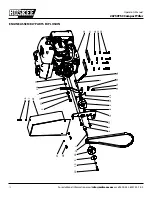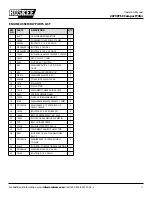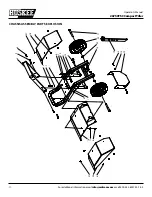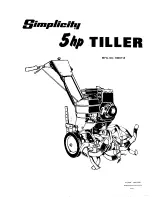
5
Operator's Manual
26750TSC Compact Tiller
For additional information email
or call 800-345-6007 M-F 8-5
•
Tines rotate when the tiller is engaged; tines rotate when the
drive safety control lever is pulled down. Releasing the drive
safety control lever to the neutral position stops the tines.
•
Do not overload the machine capacity by attempting to till
too deep at too fast of a rate.
•
Be careful when tilling in hard ground. The tines may catch
in the ground and propel the tiller forward. If this occurs,
let go of the handlebars and do not restrain the machine.
•
Take all possible precautions when leaving the machine
unattended. Disengage all control levers, stop the engine,
wait for all moving parts to stop, and make certain guards
and shields are in place.
CaUTION
HOT GaSES aRE a NORmal BY-PRODUCT OF a FUNC-
TIONING CaTalYTIC CONVERTER. FOllOW all SaFE-
TY INSTRUCTIONS TO PREVENT BURNS aND FIRES.
DO NOT alTER/mODIFY ENGINE:
NEVER alTER OR mODIFY THE ENGINE FROm THE
FaCTORY. SERIOUS INJURY OR DEaTH maY OCCUR IF
ENGINE IS mODIFIED OR alTERED.
WHEN WORKING ON OR REPlaCING PaRTS FOR THE
ENGINE OR PRODUCT, YOU mUST alWaYS DISCON-
NECT SPaRK PlUG WIRE FROm THE SPaRK PlUG aND
KEEP IT aWaY FROm THE SPaRK PlUG.
ENGINE SaFETY PRECaUTIONS
Warning Carbon monoxide Poisoning
Engines give off carbon monoxide, an odorless, colorless,
poison gas. Carbon monoxide may be present even if you
do not smell or see any engine exhaust. Breathing carbon
monoxide can cause nausea, fainting or death, in addition
to drowsiness, dizziness and confusion. If you experience
any of these symptoms, seek fresh air and medical attention
immediately.
If your product comes with a separate engine manual, be
sure to read and follow all safety and warning precautions
outlined there, in addition to any in this manual.
Preventing Carbon monoxide Poisoning
•
Always start and run engine outdoors. Do not start or run
engine in an enclosed area, even if doors or windows are
open.
•
Never try to ventilate engine exhaust indoors. Carbon
monoxide can reach dangerous levels very quickly.
•
Never run engine outdoors where exhaust fumes may be
pulled into a building.
•
Never run engine outdoors in a poorly ventilated area where
the exhaust fumes may be trapped and not easily taken
away. (Examples include: in a large hole or areas where hills
surround your working area.)
•
Never run engine in an enclosed or partially enclosed area.
(Examples include: buildings that are enclosed on one or
more sides, under tents, car ports or basements.)
•
Always run the engine with the exhaust and muffler pointed
in the direction away from the operator.
•
Never point the exhaust muffler towards anyone. People
should always be many feet away from the operation of the
engine and its attachments.
•
Do not change the engine governor settings or over-speed
the engine.
WaRNING
ENGINES GIVE OFF CaRBON mONOxIDE, aN ODOR-
lESS, COlORlESS, POISON GaS. CaRBON mONOxIDE
maY BE PRESENT EVEN IF YOU DO NOT SmEll OR SEE
aNY ENGINE ExHaUST. BREaTHING CaRBON mON-
OxIDE CaN CaUSE NaUSEa, FaINTING OR DEaTH, IN
aDDITION TO DROWSINESS, DIZZINESS aND CONFU-
SION.
IF YOU ExPERIENCE aNY OF THESE SYmPTOmS, SEEK
FRESH aIR aND mEDICal aTTENTION ImmEDIaTElY.
Gasoline Fires and Handling Fuel Safely
Use extra care in handling gasoline and other fuels. They are
flammable and vapors are explosive.
•
When storing extra fuel be sure that it is in an appropriate
container and away from any fire hazards.
•
Prevent fire and explosion caused by static electric discharge.
Use only nonmetal, portable fuel containers approved by the
Underwriter’s Laboratory (U.L.) or the American Society for
Testing & Materials (ASTM).
•
Always fill fuel tank outside in a well ventilated area. Never
fill your fuel tank with fuel indoors. (Examples include:
basement, garage, barn, shed, house, porch, etc.) Never
fill tank near appliances with pilot lights, heaters, or other
ignition sources. If the fuel has to be drained, this should be
done outdoors with the proper equipment. The drained fuel
should be stored in a container specifically designed for fuel
storage or it should be disposed of carefully.
•
Never remove the fuel cap or add fuel with the engine
running. Stop engine and allow to cool before filling.
•
Never drain fuel from engine in an enclosed area.

















